Parenting
PRACTICAL TIPS
Parents of young children (preschool age) should have few expectations in terms of behavior and acquisition of knowledge due to the cognitive limitations at this age. This does not mean that children should be allowed to run about and do as they please; they still require guidelines and boundaries. What it does mean is that care should be taken regarding the methods that are used to raise children and the values that are instilled from the very beginning. It is interesting to note that the Arabic term tarbiyah, which is often used to mean teaching or training, generally refers to growth, increase, nourishment, and cultivation. This is relates to the physical, intellectual, emotional, psychological, and spiritual aspects of an individual. When thinking of growth and cultivation this implies that something has already been planted or is already present (natural fitrah). Talbiyah then refers to the various methods that are used to watch over and attend to a child until he or she becomes prepared to take responsibility and behave in complete submission to and worship of Allah (S.W.T.). The following suggestions are techniques that may be used for tarbiyah for early childhood.

PLAY, PLAY, PLAY:
Play should be the primary emphasis during this time in a child’s life since this is the means through which they gain an understanding of the world qround them. Pretend or imaginative play is the most common type of play during this stage and this directly impacts cognitive, social, and psychological development. Children will often mimic or imitate the behavior of adults or other children around them in their play, which is their way of preparing for their roles in life. Girls will most often imitate their mother, and boys will follow in the footstep of their father. You will see girls playing with dolls, dressing and feeding them and boys in more rough-and-tumble physical types of play. This gender roles develop at an early age and are a natural part of Allah’s (S.W.T.) plan for the differentiation of responsibilities for men and women. These and other types of play should be encouraged and fostered in young children.
PREVENTION:
The saying “Prevention is the best medicine” is true not only in the medical field, but also within psychology. There are many steps that parents can take to prevent misbehavior and avoid the disruption that this can cause within the family. First of all, children need predictability, structure, and guidelines because this gives them a sense of security and a feeling that there is order in the world. When this is present they are less likely to feel anxious or stressed which, in turn, will decrease the likelihood of inappropriate behavior. Children will sometimes act chaotic if they are in a chaotic environment. Secondly, probably the most common reason for misbehavior is to gain attention from a parent or other adults. A defining feature of being human is the need for social contact, approval, and attention that is already present at birth. When parents fulfill this need adequately, a child will feel content and be more likely to engage in solitary play. If a child is not able to obtain attention through positive behavior, he or she may utilize negative behavior for this purpose. Parent can fulfill this need by spending quality time which their child (e.i. , talking, playing, reading, enjoying nature, and much more). Quality is often more important than quantity.
REWARDING POSITIVE BEHAVIOR:
The concept of rewards and punishments is an integral part of Islamic Aqueedah as there are natural consequences for each of our actions. This same wisdom can be applied to the area of parenting. The Messenger of Allah, (S.A.W.), said that Allah (S.W.T.), says, “Allah has written down the good deeds and the bad ones. Then He explained it (by saying that) he who has intended a good deed and has not done it, Allah (S.W.T.) writes it down with Himself as a full good deed; but if he has intended it and has done it, Allah (S.W.T.) writes it down with Himself as from ten good deeds to seven hundred times, or many times over. But if he has intended a bad deed and has done it, Allah (S.W.T.) writes it down with Himself as a full good deed, but if he has intended it and has done it, Allah (S.W.T.) write it down as one bad deed.” [Bukhari and Muslim]
Allah’s mercy can be seen in this Hadeeth Qudsi and this should be reflected in a parent’s tarbiyah as well. Reward are effective in not only increasing the occurence of positive behavior, but also in decreasing negative behavior and increasing a child’s self-esteem. The most effective rewards for children are those that are the easiest to give praise, encouragement, hugs, thanks, etc.
IGNORING MISBEHAVIOR:
Many of the inappropriate behaviors of your children can simply be ignored or disregard. The Prophet, (S.A.W.), is our best example in this regard. Anas ibn Malik said, “The Prophet (S.A.W.), had the best disposition among people. One day he sent me on an errand and I said, ‘By Allah, I will not go,’ but it was in my mind that I would do as the Prophet (S.A.W.) had ordered me. I went until I came upon children playing in the street. Then the Prophet (S.A.W.) arrived and he caught me by the back of my neck from behind. As I looked at him, I found him smiling, and he said, ‘Unays (Anas’ nickname),did you go where I asked you to go?’ I said ‘O Prophet of Allah, yes, I am going.'” Anas said further, “I served him for nine years, but I do not know that he ever said to me about anything I did, why I did that, or about anything I had neglected, why I had not done that.” (Muslim). We may want to compare this to how we react to or interact with our own children. For young children, in particular, it is really counterproductive to berate, question, and reprimand when they really have little understanding as to why they acted in a certain way. Simply ignoring the behavior may be the most appropriate response. Another related technique is to redirect the child to something else in the environment to draw attention away from the undesirable.
It is important to realize that within these general guidelines there are about as many ways to parents as there are parents. Parents need to take into consideration the unique personalities, dispositions, and gifts of each child when deciding upon a particular approach. What may work with one child may not necessary be effective with another. It is also imperative to remember that our children are one of the greatest tests that we have from Allah (S.W.T.), and we need to continually ask Him for assistance and guidance for ourselves and our children. This is the most effective and powerful tool for tarbiyah. “When My servant ask you (Muhammad) concerning Me, I am indeed near. I respond to the prayer of every suppliant when he calls on Me. Let them also, with a will, listen to My call and believe in Me, that may walk in the right way.” [Surah AL-Baqarah (2:186)]
STARTING EARLY
READING TO TOTS PREPARES THEM FOR LIFE
What is the secret to your toddler getting ahead in life? The answer lies in books.
Children who have not developed some literacy skills by the time enter school are three four times more likely to drop out in later years.
So as a parent, what can you do before your child heads to kindergarten to prepare him or her to not only be a good reader but a lifelong lover of books?
Here are some suggestions on reading with preschoolers:
- When you take your kids to the library, allow them to pick out their own books even if you think they are silly. But add your choice of high-quality books to the pile as well. This way the children get a mix of both. If a child picks out a book at the library that seems beyond his or her comprehension level, still check it out.
- When children are young, it is very common for them to want to have one book to read over and over again. Don’t refuse to read it–keep reading it as long as your child wants it read. He or she getting something out of this book that is important.
- When reading to your toddler, don’t make it into a lesson on something such as spelling or phonies–just make it fun for him or her. Focus on the idea that this time is all about the story and the child’s comprehension of the story.
- Once you are into the story, follow the child’s lead. If he or she breaks into your storytelling to spontaneously read or write a word, go along with it.
- Here is a fun game to try: Have the child tell a story while the parent write it down verbatim on different pages. Then the child can draw the cover and the pictures for the story.
- Kids need active time and quiet time. Know your child. Don’t introduce the idea of reading a book when they are in the mood to run around the yard.
- When children start to get interested in words, signs on the road are intriguing to them. So when you are driving, take the time to say, “There is a stop sign,” so your child will associate the big letters that spell out “STOP” with the action of the car stopping.
- Four and 5-years-old like to play with words and will make up nonsense words and songs. It’s a normal stage of development, and don’t discourage them when they have fun with rhyming games or words.
THE ART OF READING OUT LOUD
Research and practice show one simple activity-reading aloud–Is the best way to prepare children for learning to read and keep them reading as they learn and grow. Reading aloud helps your children develop the language skills that they will use in school and throughout their lives.
Reading aloud also creates a special time for you to bond with your children. Cuddle together as you share adventures. Laugh at silly characters, root for heroes and wag your fingers at villains.
PREPARE
Preview the book before you read it to children. This helps you spot material you may want to shorten, take out completely or expand on. Think about your children (ages, development levels, interests) and what you want them to get out of the story. That will help you decide what questions you want to ask (or comments you want to make) and where (before, during or after the story).
BEFOREHAND
- Before you start reading, make sure everyone is comfortable.
- Show the cover and read the title and the author of the book. Ask the children about the cover.
- Suggest things the children can look at or listen for during the story.
- Flip through the pages and point out the illustrations to the children.
- Then make predictions based on what you both see in the book.
- Discuss things that the children might have in common with the characters or the setting of the story.
DURING A STORY
- Change your voice to fit the mood or action.
- Move your finger under the words as you read them.
- Show the pictures as you read.
- Allow children to ask question, make comments or make predictions about the plot, the characters and the setting.
AFTER YOU READ A STORY
Ask question about the story or give them some test:
- What is the Title of the story?
- Who is the Author?
- Where does the story take place?
- How did the story make you feel?
- What is your favorite part of the story and why?
- Who is the most important character and why?
- What is the problem or conflict in the story?
- How is it solved?
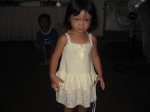
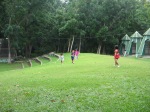
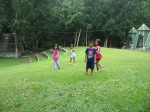
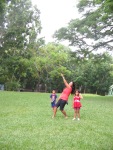
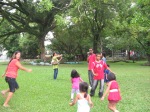

Leave a comment